BGI Genomics 2024 Global State of Colorectal Cancer Awareness Report
2024-05-28
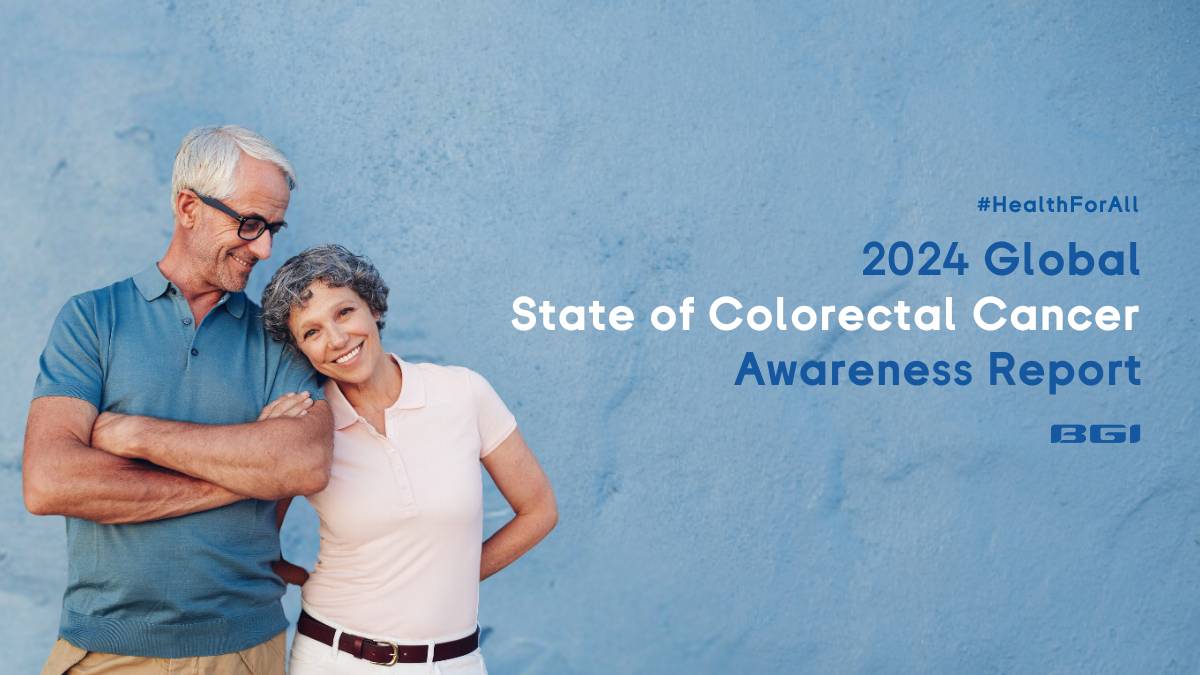
According to the WHO, colorectal cancer (CRC) is the third most common cancer worldwide, accounting for approximately 10% of all cancer cases and ranks as the second leading cause of cancer-related deaths worldwide.
With the implementation of effective screening programs, the incidence rates of colorectal cancer have been decreasing in high-income countries. However, there is significant geographical variation in incidence and mortality, with Eastern Europe indicating the highest mortality rate. By 2040, the burden of colorectal cancer is projected to increase to 3.2 million new cases and 1.6 million deaths per year representing a 66% and 71% rise in new cases and deaths respectively relative to 2020.
To better address the global burden of CRC and reduce its impact, BGI Genomics has launched the second edition of its global colorectal cancer awareness report, covering 1,938 respondents aged above 35 years old from Brazil (306), China (367), Poland (300), Saudi Arabia (300), Thailand (362), and Uruguay (303):
CRC Screening Gaps Vary Globally: Nearly half (49.3%) of global respondents have never undergone CRC screening, with the highest proportions in Saudi Arabia (62.0%) and Poland (61.0%). This highlights a significant gap in awareness and accessibility of screening programs, which are crucial in early cancer detection and prevention.
Preference for Fecal Testing Over Colonoscopy: Although colonoscopies are more recognized (33.4%), fecal tests at healthcare facilities are preferred (31.8%), reflecting a trend towards non-invasive methods. This preference highlights the potential for increasing screening uptake through promoting easier and more accessible testing methods.
Cost and Fear are Screening Barriers: Fear of colonoscopy (18.2%) and screening costs (17.7%) are major barriers to CRC screening, highlighting the need for affordable, less invasive testing options. In Uruguay, 54.1% prefer inexpensive options, while in China, 68.4% favor moderately priced tests, indicating that cost-effective solutions are crucial for broader acceptance and participation.
Medical Advice and Family History Drive CRC Screening: Doctor’s recommendations are a major driver for CRC screening (30.5% globally), with Uruguay showing the highest adherence (44.1%). Additionally, those with a family history of CRC are more proactive in screening (64.5%), compared to the general population (35.0%). This points to the critical role of healthcare professionals and familial awareness in encouraging screening.
Prof. Varut Lohsiriwat from Mahidol University offers his insights to this report. He suggested:
"The essence of effective cancer screening lies in the acceptance and adherence of the patient to the screening method. Doctors can explain the pros and cons of different screening methods within a brief period, usually 3 to 5 minutes. However, the decision ultimately rests with the patient. The best screening method is the one that the patient accepts and adheres to because that’s the method that will actually benefit them."
Dr. Zhu Shida, BGI Genomics Deputy GM, notes: “While colonoscopy remains the gold standard for colorectal cancer detection, its application is limited by the need for significant medical resources and the time-intensive nature of the procedure. This makes it challenging to reach and benefit a broader range of patients, particularly in resource-constrained settings. At BGI Genomics, we recognize that there is a gap and we focused our efforts on developing advanced molecular biology testing techniques to close the gap. The ultimate goal is to transform colorectal cancer from a life-threatening disease into a manageable condition through widespread, early screening and intervention.”
CRC Awareness Levels
Research indicates that CRC age-standardized incidence rate in high-income countries (HIC) was four times higher than in low- and middle-income countries (LMICs) whilst mortality rates were 17% higher in LMICs. The mortality rate of HIC is lower than that of LMIC, which is related to the high screening coverage and also to the differences in health care resources, medical level and medical facilities.
What’s the level of CRC awareness worldwide?
The result shows that 49.3% of global respondents never had a CRC screening test, with Saudi Arabia (62.0%) and Poland (61.0%) with the highest proportion. Among respondents with a family history of CRC, only 23.2% never had a screening test, indicating that family awareness significantly increases CRC screening rates among individuals with a family history of the disease.
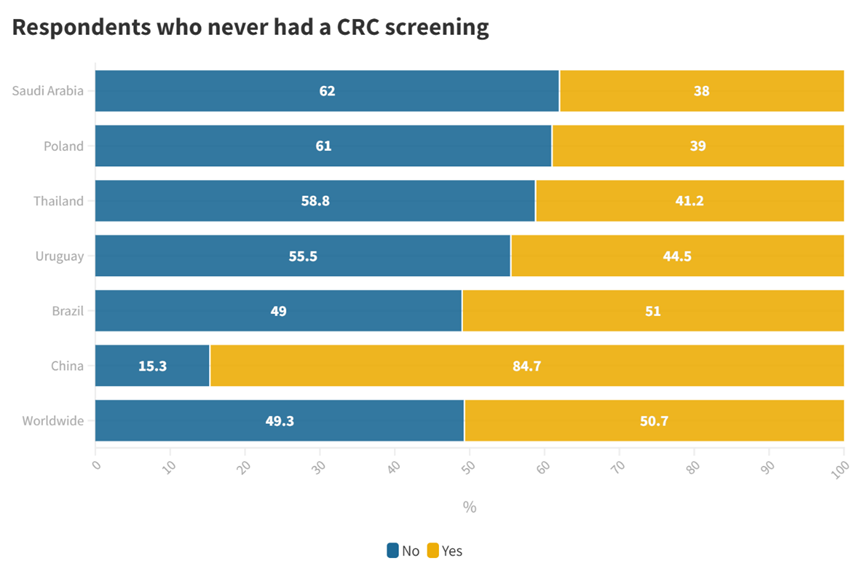
Meanwhile, 47.4% feel that there is insufficient information about CRC, e.g., symptoms, and recommended screening age. Uruguay (60.1%) and Poland (55.6%) are the most likely to feel there’s not enough information for them to assess their own CRC risk.
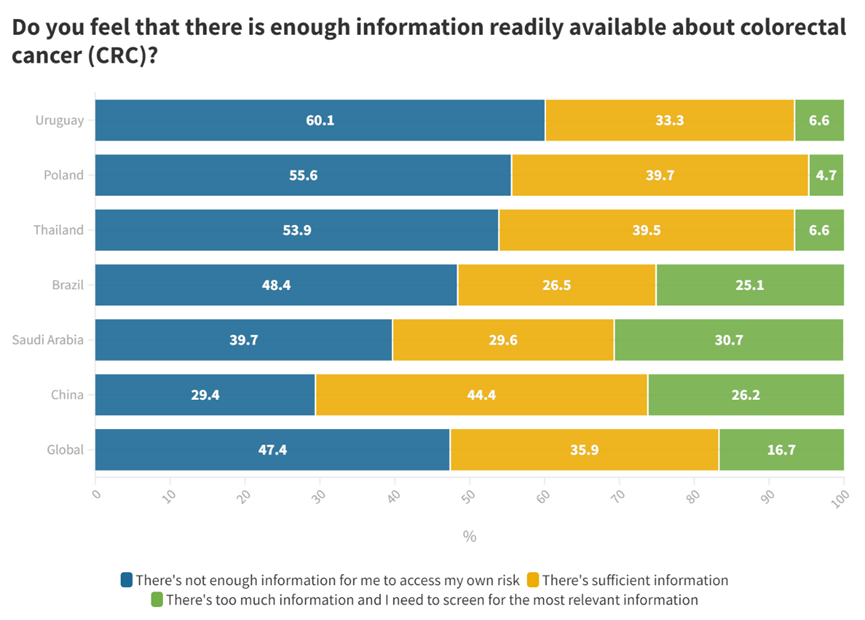
National or healthcare industry specialist websites (15.0%), general news websites (13.5%) and television (13.4%) are the top channels for obtaining CRC-related information. Saudi Arabia (17.3%) and Poland (17.0%) have the highest percentage citing national or healthcare industry specialist websites as a source of information. China (14.5%) and Uruguay (16.4%) have the highest percentages of obtaining information through CRC promotion and family/friends respectively.
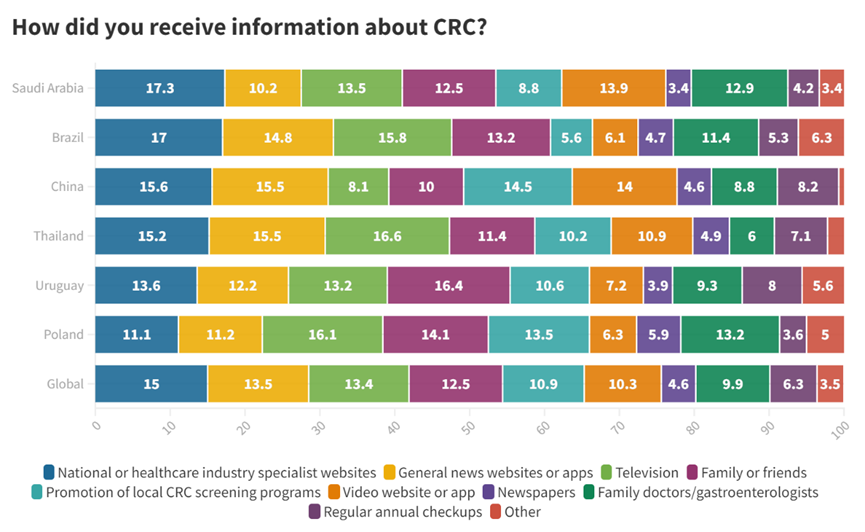
Attitudes towards CRC Screening
Most countries’ colorectal cancer screening guidelines recommend that individuals with no symptoms nor a family history of colorectal cancer, should begin regular screening at age 50. The U.S. Preventive Services Task Force (USPSTF) guidelines issued in 2021 suggest regular screening at age 45.
Is there an awareness gap for CRC screening?
A total of 40.4% indicated ‘no’ or ‘not sure’ as to whether CRC could be detected through early screening. Uruguay (59.7%) and Brazil (54.2%) have the highest percentage in this category. This lack of awareness about CRC screening effectiveness is particularly worrying as precancerous polyps can detected to boost survival rates and reduce expenses. These polyps are the abnormal growth of tissues in the colon or rectum, can take 10-15 years to develop into cancer.
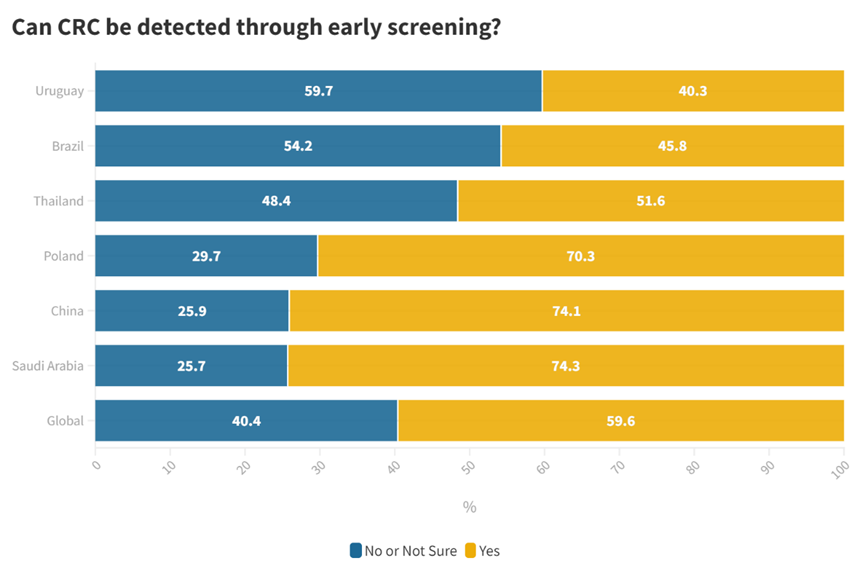
Colonoscopies rank as the best-known screening method worldwide at 38.4%, with fecal testing at a healthcare facility ranking second at 27.0%. Yet, fecal testing at a healthcare facility is the screening method most widely accepted by respondents (31.8%) ranking slightly above colonoscopies (31.3%).
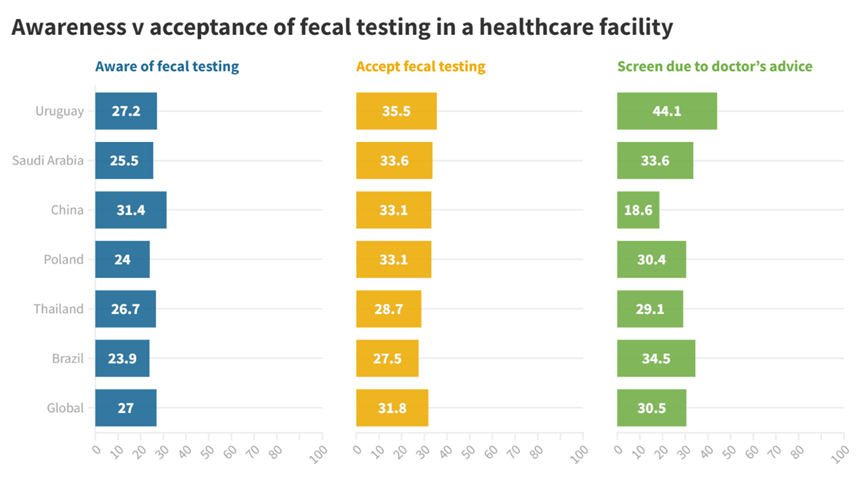
The higher acceptance of fecal testing at a healthcare facility relative to awareness seems contradictory but given that doctor’s recommendation (30.5%) is the biggest single factor that makes individuals more likely to undergo screening for CRC without any symptoms, it is possible that after patients express the fear for invasive colonoscopy screening, these doctors are recommending fecal testing as a cheaper, and non-invasive alternative to colonoscopy. Unlike a colonoscopy, these is no prior dietary restrictions or changes of medication required.
Uruguay (44.1%) and Brazil (34.5%) have the highest proportion of respondents choosing to take their doctors’ advice.
What's holding people back from CRC screening?
Fear of colonoscopy (18.2%) is the top reason holding people back from CRC screening, followed by costs (17.7%). Poland (24.7%) and Uruguay (21.0%) show the highest fear of colonoscopy, while Thailand (24.5%) and Brazil (20%) indicate the most concern about costs. The result highlights the need for affordable, less invasive testing options.
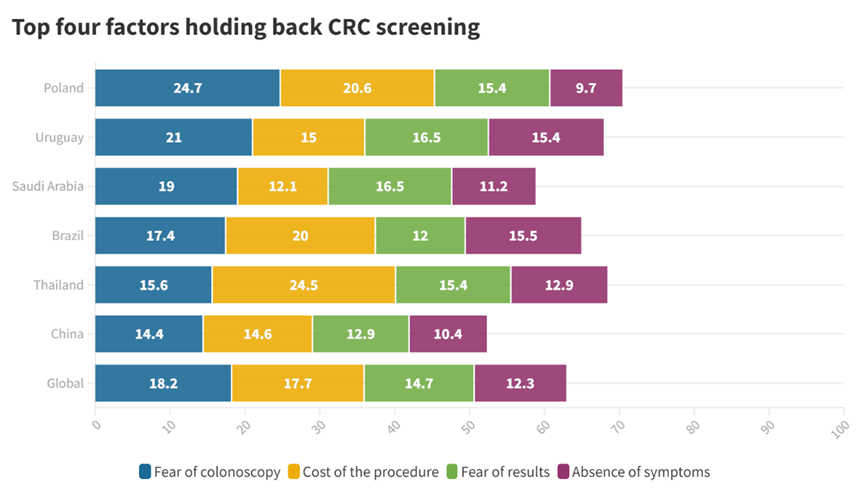
A total of 47.2% worldwide prefer moderately priced screening options with good accuracy and 38.7% prefer inexpensive options with average accuracy. In Uruguay, 54.1% prefer inexpensive options, while in China, 68.4% favor moderately priced tests. Therefore, it is imperative for healthcare providers to match these preferences with the relevant screening tests.
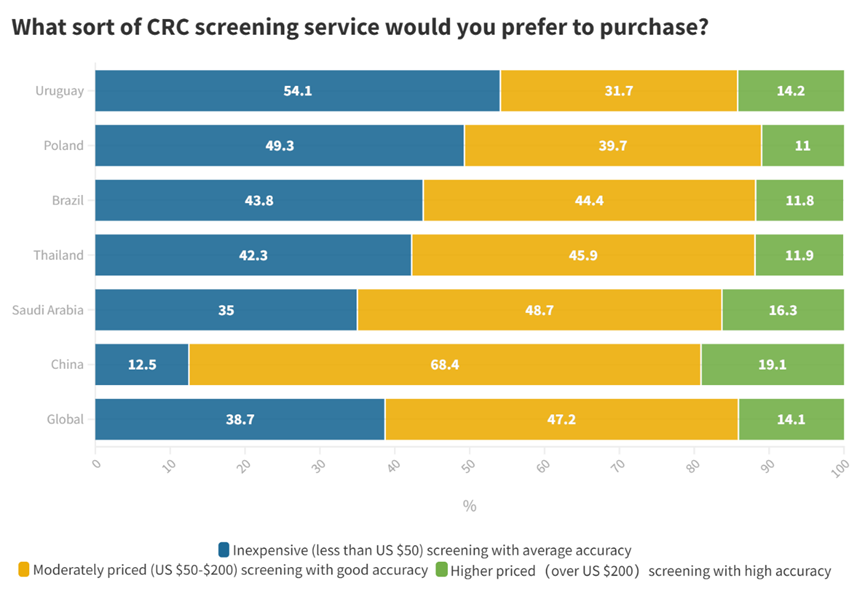
Fecal gene methylation testing is a relatively new CRC screening technique that allows self-collection of samples at home, mailing to a professional testing facility, and accurately assessing colorectal cancer risk through DNA methylation markers. In terms of the factors to accept this type of screening, accuracy (32.6%), convenience (28.2%) and affordability (21.9%) rank the highest.
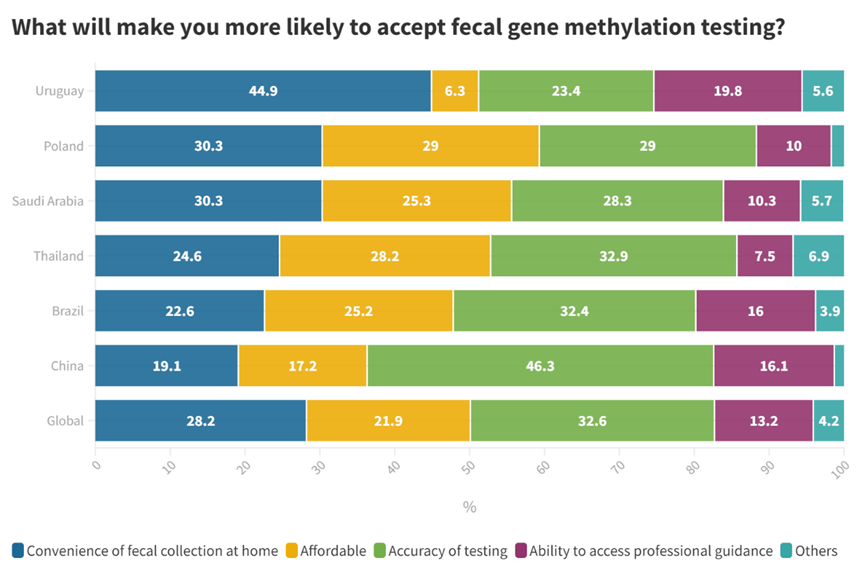
Changing attitudes with awareness
How does awareness shape attitudes towards screening?
Higher CRC survival rates are associated with earlier detection. 86.9% are more willing to go for screening after learning that early detection of CRC results in a relatively higher survival rate. China (94.8%) and Uruguay (94.4%) have the highest percentage who are more willing to undergo screening under these conditions.
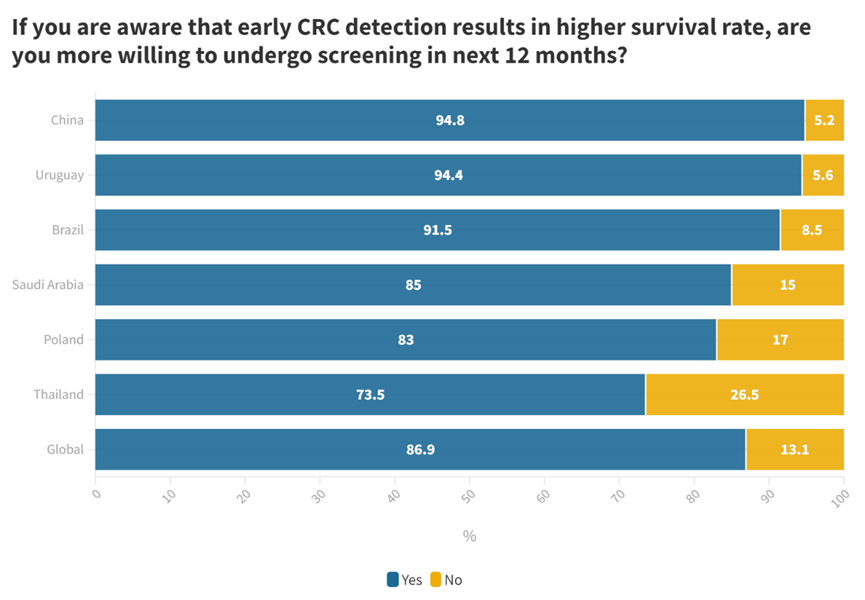
A total of 64.5% of individuals with CRC or a family history of CRC have taken their family members for screening, compared to only 35.0% of all respondents. This is in line with National Comprehensive Cancer Network (NCCN) guidelines that state that family members should start screening at age 40 or 10 years before the earliest diagnosis of CRC in the family.
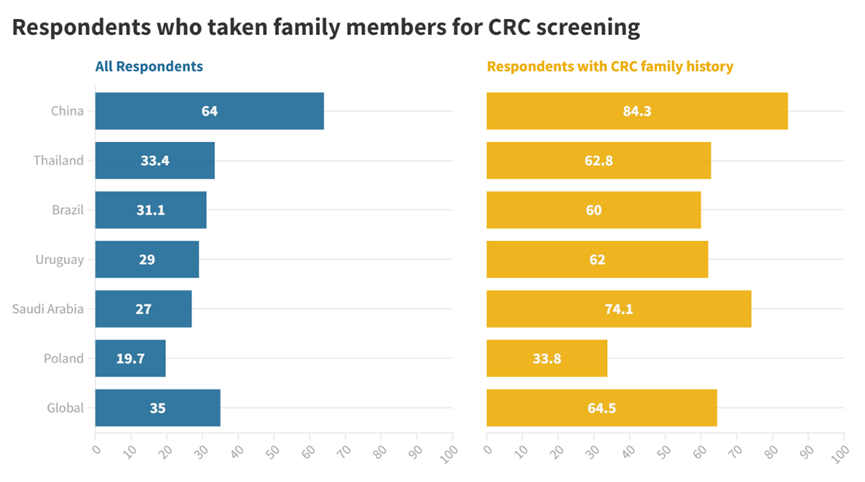
About COLOTECT
COLOTECT is a non-invasive fecal DNA test developed by BGI Genomics for detecting CRC and precancerous lesions. It uses multiplex methylation-specific PCR (MSP) technology to trace abnormal DNA-methylation biomarkers in CRC from stool samples. It has 88% CRC sensitivity, and for early detection, its sensitivity for advanced adenoma is 46%, which are both superior to conventional fecal tests.
Methodology
The 1,938 respondents from Brazil (306), China (367), Poland (300), Saudi Arabia (300), Thailand (362), and Uruguay (303) participated in this survey in March 2024.
When this survey was conducted in March, these respondents were based in their respective countries or regions. All data involved in this report come from the results of an online survey project conducted by BGI Genomics. It only conducts an anonymous survey on awareness related to colorectal cancer and does not involve personally identifiable private data.
Survey forms in the respective local languages were sent. Respondents were aged between 35 to 75 years old with an even male-to-female sex ratio. This survey was carried out by SurveyMonkey Inc.
Read More:
2023 Global State of Colorectal Cancer Awareness Report